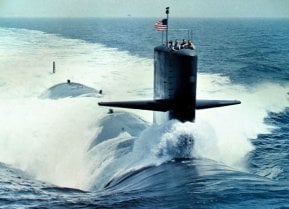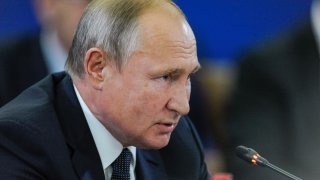What North Korea’s Partnership with Russia Means for U.S. Strategy
With the news that Russia-North Korea security cooperation is more than just arms deal and technology transfer or sharing but involves North Korean troop deployment and participation, what does it tell us about North Korea’s intentions, and what should be the U.S.’s response going forward?
North Korea’s Bet on a New International Order Using Russia: With the news that Russia-North Korea security cooperation is more than just arms deal and technology transfer or sharing but involves North Korean troop deployment and participation, what does it tell us about North Korea’s intentions, and what should be the U.S.’s response going forward?
Contrary to some claims, the budding North Korea-Russia relations will likely endure as North Korea makes long-term strategic changes that will outlast the Ukraine War because North Korea sees fundamental shifts in the international order that it’s betting on. It may gain materially from its newfound partnership with Russia, but Pyongyang’s recent moves suggest that it is going all out to bet on the emergence of a new multipolar order in which the U.S. and the West will no longer exert hegemonic influence on conflicts and issues that are perceived to have little bearing on them.
Pyongyang’s firm belief in its foresight is suggested by its recent actions that are aimed at demonstrating a commitment to its mutual defense treaty with Russia and stonewalling not just the U.S. and South Korea but also China. While many have been skeptical about the strength and depth of Moscow-Pyongyang cooperation, North Korea seems genuinely committed.
The lavish treatment it afforded to Putin earlier this year in June as part of elevating the bilateral ties was also a promulgation for the North Korean public, a sign that Pyongyang is serious about making deepening bilateral relations the new norm in its domestic discourse.
A diplomatic treatment of a similar scale that involved the North Korean public was last observed in September 2018 when the then South Korean President Moon Jae-in visited Pyongyang and became the first South Korean leader to give a speech to the North Korean public in May Stadium that included calling for unification and denuclearization.
North Korea not only committed to the military agreement signed during this summit but also its subsequent talks with the U.S. While this rapprochement did not last, it demonstrates that North Korea, at least for now, is dedicated to its elevated partnership with Russia.
The latest Moscow-Pyongyang partnership also wasn’t built overnight. North Korea invited Chinese and Russian government delegates to attend events marking the armistice of the Korean War in July 2023, the first time it has invited foreign delegates to attend its military parade since February 2018. The burgeoning cooperation elevated to leader-level correspondence in the form of a birthday letter in August, which was soon followed by face-to-face diplomacy, first in September 2023 and again in June 2024. Kim Jong Un is also slated to make a reciprocal visit to Russia next year following Putin’s invitation.
The most significant indicator of North Korea’s resolve to stick to its gun about the emerging new order is the shift in its inter-Korea policy. First, it called for abandoning unification with South Korea not just in policy but in institutions as well by abolishing all organizations tasked with inter-Korea policies in January 2024.
Then, it proceeded with material provocations by sending trash balloons since May 2024 in retaliation for propaganda broadcasts from the South and subsequently fortifying the border, demonstrating its willingness to escalate by retaliating, including resorting to the use of force. Most recently, it blasted the highway and railway connecting the two Koreas, giving a final blow to any remaining aspirations for unification.
What Does this Mean for the Next American President?
With two ongoing wars and the U.S. distracted by its domestic politics and the upcoming presidential election, the current period cannot get any better for North Korea to pivot its betting on building relations with Russia and its view of the future of the international order.
Pyongyang has learned from the West’s lackluster responses and adherence to non-intervention in the two wars in Ukraine and Gaza that it can further push the boundaries of sanctions. With Russia’s backing via its veto in the UN Security Council, it has also found itself a sanctions haven so that it can focus on its weapons development and evade additional sanctions, at least for as long as the war in Ukraine persists.
Unfortunately, time is on North Korea’s side. As the war in Ukraine drags on as it has been for almost three years, it buys North Korea time to perfect its satellite technology with Russia’s help.
A fallout between Moscow and Pyongyang is always possible, but North Korea stands to benefit at the end of the day even if Russia loses the war. China has been following a hands-off approach and will remain ambivalent towards Pyongyang, while Kim knows that South Korea will remain eager to restore inter-Korea communication on any given day.
With the U.S., Pyongyang will use whatever it has gained materially or not from its new alliance with Russia as leverage for talks with the U.S. Having learned from the 2018 to 2019 talks that the U.S. simply refuses to negotiate with Pyongyang as an equal, it will raise the bar for any communication even if Donald Trump wins the election.
North Korea is, and has been, more resilient than assumed by many watchers and analysts in the West. Now that it has found an almost perfect partner in crime to mold an international order in its favor, a more definitive action by the U.S., whether toward the war in Ukraine or North Korea, is inevitable.
About the Author:
Minseon Ku is a postdoctoral fellow with the Diplomacy Project at the Global Research Institute at William & Mary.
Image Credit: Creative Commons and/or Shutterstock.


